Oct 27, 2024 – English Dharma Q&A, Day 2 of the Jungto Social and Cultural Center Revitalization Meeting, Departure for Bhutan
Today is the second day of the meeting for revitalizing the Jungto Social and Cultural Center, where all the leaders of Jungto Society units have gathered at the Seonyudong Education and Training Center.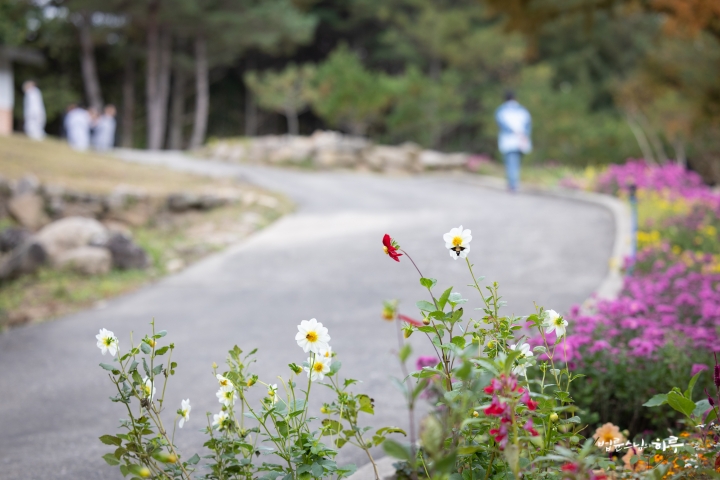
Sunim woke up at 4:30 AM and participated in the 1000-Day Practice prayer and 300 prostrations with everyone. After that, from 7 AM, they had breakfast and took a walk.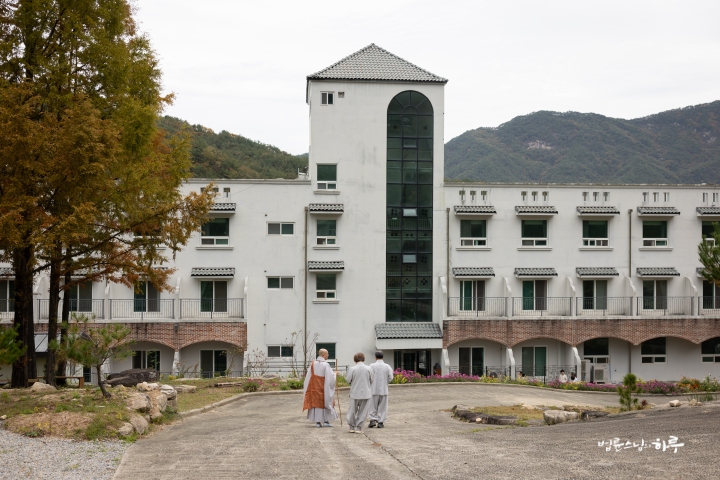
While the members were walking around the center, Sunim conducted a live Dharma Q&A session in English for foreigners from 8 AM. About 260 foreigners from around the world connected to the live broadcast as Sunim began the conversation by sharing news of autumn in Korea.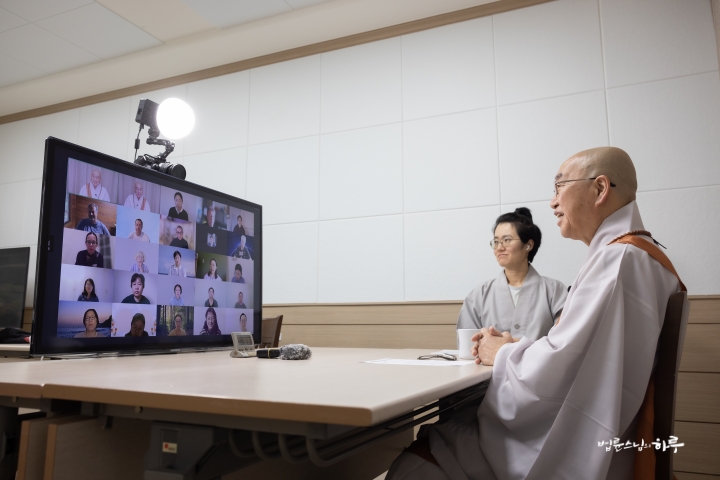
Three people had requested to ask questions in advance and took turns asking Sunim. One of them sought Sunim’s advice on how to manage their emotions, as they had a relapse of bipolar disorder and were experiencing various side effects from the prescribed medication.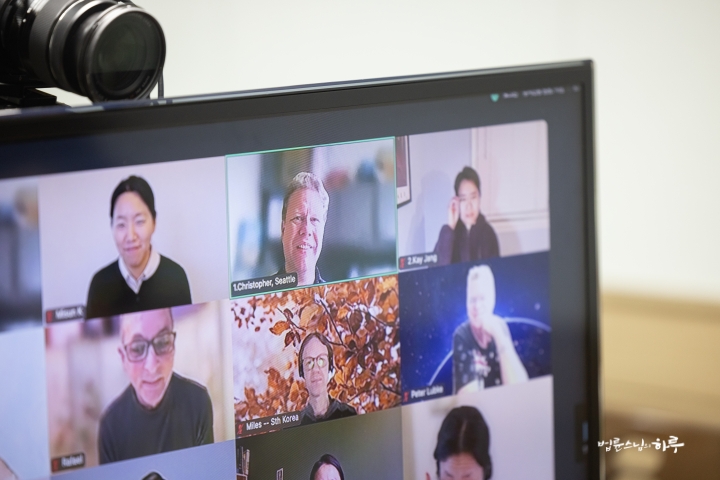
I’m Struggling with the Side Effects of Medication After Being Diagnosed with Bipolar Disorder
“When we talk about treatment, we often think only of complete recovery. However, treatment isn’t just about complete recovery; there are methods where the disease is treated to about 80 percent, methods that maintain the current condition, and methods that slow down the rate of deterioration even while receiving treatment. We should consider that there are various approaches to treatment.
The disease that appeared in your 20s may have seemed somewhat cured, but it can recur. It’s not shocking because the disease has returned, but because you wished it wouldn’t come back. However, in this world we live in, many things happen that we don’t want, not just related to health. Our life journey isn’t about preventing things from happening, but about solving various issues as they arise. If bipolar disorder has recurred now, you should receive treatment.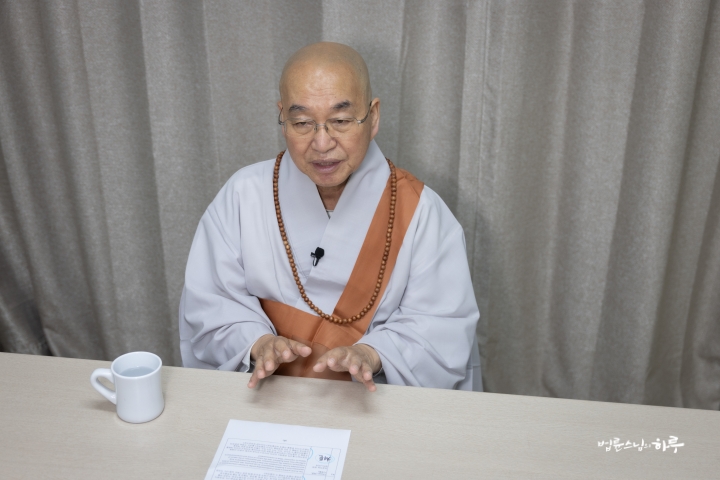
However, medication can have side effects. If I have mild atopic symptoms that cause itchy skin and take medication for it, the atopy might subside a bit, but my stomach might worsen. If I take it more regularly, my liver might deteriorate. In such cases, you need to choose based on what’s more serious at the moment. If your stomach is bad, you can take both skin medication and stomach medication. If that doesn’t work and the stomach condition becomes more serious, you might need to temporarily stop the skin medication. For liver issues, you might take liver medication, but if that doesn’t work, you might need to stop the skin medication for a while. If your skin condition isn’t the same all year round, but gets worse in winter and better in summer, it’s better to focus on skin medication in winter and switch to stomach or liver medication in summer. It’s essential to adjust your approach based on your health condition.
However, with bipolar disorder, stopping medication can lead to serious issues. For example, if the depression becomes severe, there’s a risk of suicide. If it manifests outwardly, there might be violent behavior. Even if medication doesn’t cure it completely, it can prevent these extreme behaviors. So if your current condition poses a risk of extreme behavior, you should take the medication even if it causes vision problems or lethargy. Staying alive takes priority over perfect vision, don’t you think? So you ultimately have to choose based on your current condition and the state of medical development. We always have a final option, which is death. But before making that final choice, we can try various other options. So there’s no need to fear the recurrence of the disease.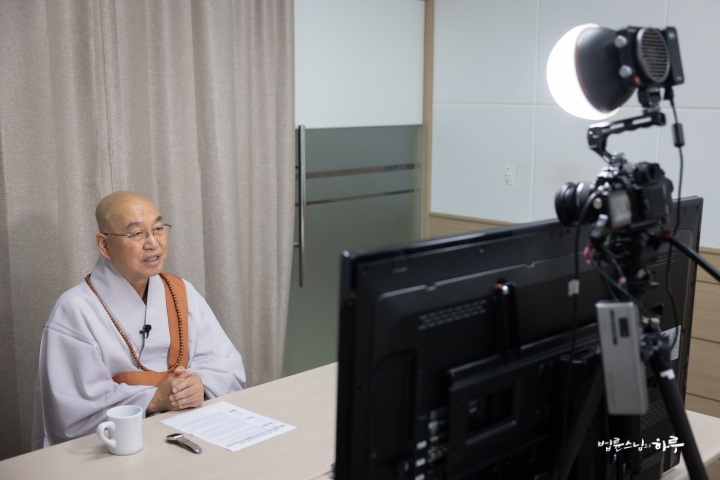
First, it’s important to follow the advice of medical professionals through various consultations with your doctor. Second, your own choices are important. If the medication is a bit strong, side effects like lethargy can be severe, and if it’s a bit weak, mood swings can be severe. From what I hear, you’re experiencing both side effects and mood swings, so it would be good to discuss with your doctor and choose what to focus on. If stabilizing mood swings is more important, you might need to increase the medication slightly. If other side effects are severe, you might need to decrease it slightly. These adjustments need to be made in consultation with professionals.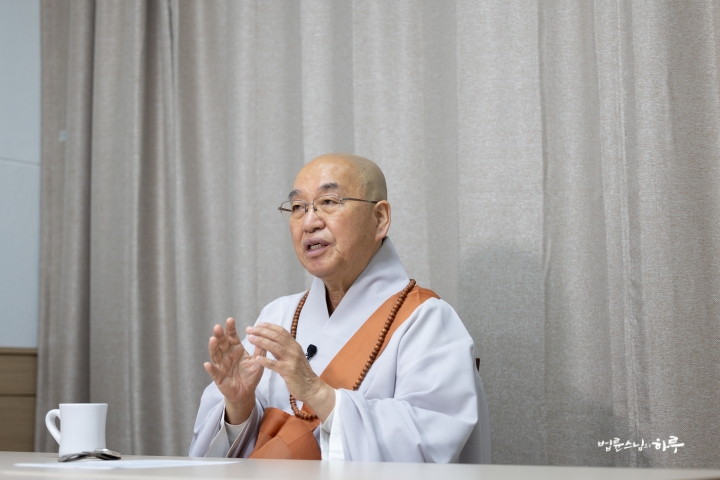
Here, practice means being grateful that you’re still alive despite these circumstances.
‘I can still live in this condition. I’m grateful.’
If you have this mindset, mood swings will subside a bit, and the medication will be much more effective. If you only focus on not being able to see well, sleeping less, or having some pain, you’ll keep feeling dissatisfied. Despite this, if you’re grateful for being alive and able to live like this, your anxious mind will start to stabilize. When your condition worsens in the future and you look back on now, you’ll realize that your current state is actually quite good. So it’s very important to recognize that your current state is good.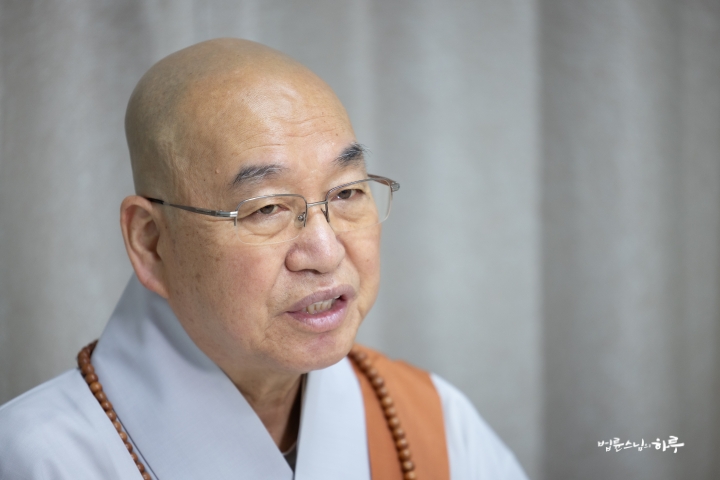
Even if your eyes don’t see well now and some parts of your body are a bit uncomfortable, you should always keep in mind, ‘I’m still grateful that I can see, move, and be alive like this.’ This is how you can live happily while you’re alive.”
“Thank you.”
The questions continued.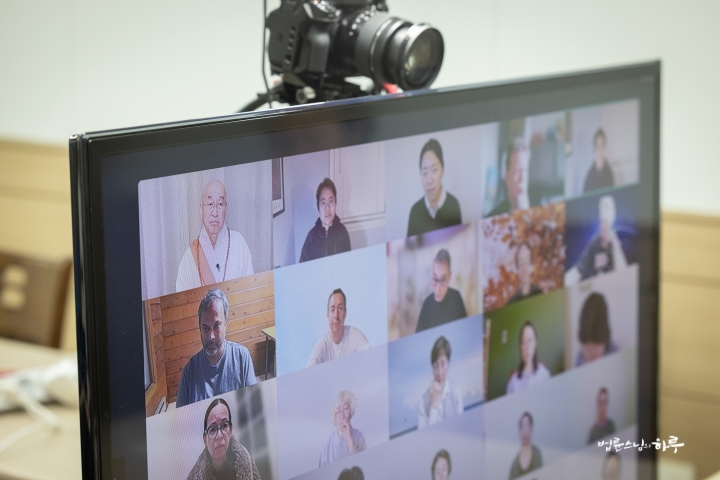
In Dharma Q&A, there are many diverse questions. Sunim, what types of questions do you consider more meaningful?
From a Buddhist perspective, can artificial intelligence (AI) reach a level similar to human consciousness? How can AI be used to practice mindfulness and compassion?
As the answer about artificial intelligence went on, it was well past 9 o’clock. From 9 o’clock, about 200 people were waiting in the main hall of the retreat center to have a meeting with Sunim. Sunim quickly ended the live broadcast and headed to the main hall.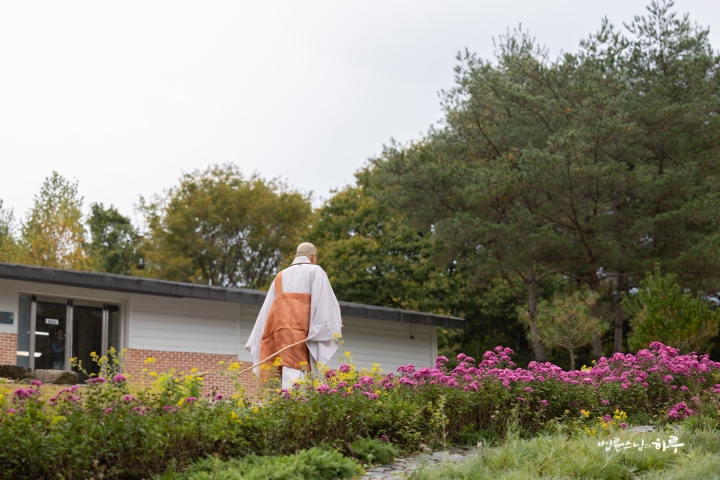
At 9:20 AM, the second day’s schedule for the Jungto Social and Cultural Center revitalization meeting began.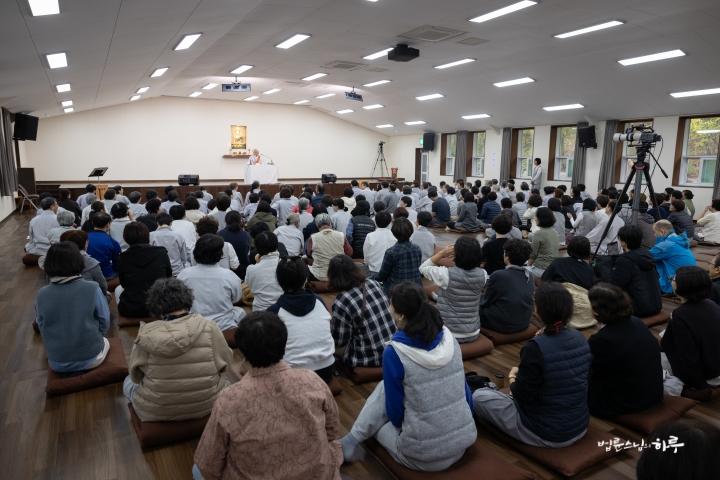
First, Sunim summarized the results of yesterday’s all-day discussion.
“Summarizing yesterday’s discussion, we all agreed to make the best use of the Jungto Social and Cultural Center to contribute to solving the current issues faced by Jungto Society. So we named the discussion topic ‘Revitalization Plan’, but it seems that wasn’t a good name as the current operating committee members raised objections, saying, ‘Does that mean we haven’t been revitalizing it?’ (Laughter)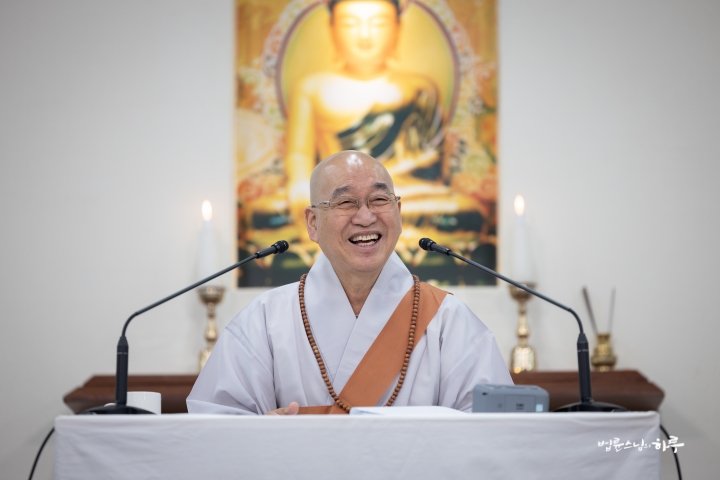
To put it simply, Jungto Society has been focusing on online activities, and the use of offline spaces has been somewhat stagnant. The intention is to increase that. So yesterday, you suggested ‘Let’s have morning and evening prayers and rituals in the Dharma hall that anyone can participate in’, ‘Let’s have offline Dharma assemblies’, ‘Let’s open the Wednesday Dharma assembly on Sundays as well’. The idea is to start programs where the general public can participate in offline spaces. In other words, for practice and Dharma assemblies, it seems we’ve agreed to make them open to anyone, not just Jungto Society members, in offline spaces.
There were also many suggestions to conduct the Jungto Dharma School and Sutra Course offline, which teach Buddha’s teachings in an easy-to-understand way. There were opinions about extending the academic period of the Buddhism course or changing the way it’s conducted. There were counterarguments that ‘Extending the academic period might not be good as it would deviate from the overall standard of the Buddhism course’. Regarding changing the way it’s conducted, there were concerns like ‘Jungto Society has evolved significantly with personalized education in online spaces, is it right to revert to the old collective lecture method?’ There were also issues raised that while online can be infinitely expanded without spatial constraints, conducting personalized classes in offline spaces has limitations in terms of space and requires more staff. It was suggested that to overcome the space shortage problem, we might need to open Buddhism courses on different days of the week.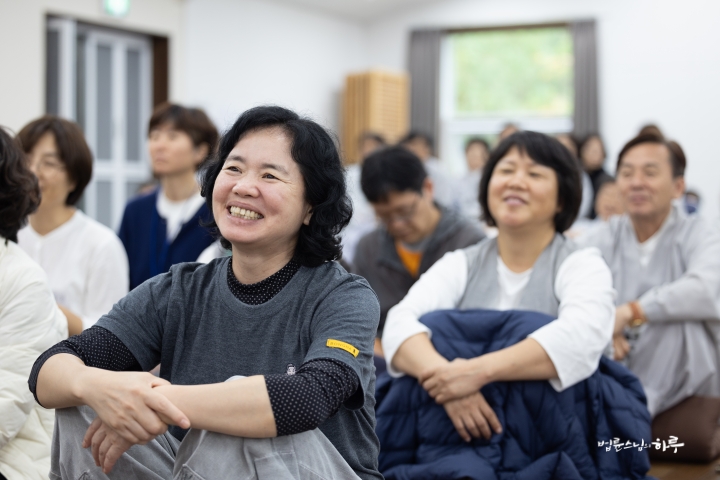
Other suggestions included creating quiet prayer spaces or meditation rooms for members to use. Conducting memorial services well for the public could also be a way to broaden contact with the public. There were also suggestions to create weekend programs where working people could do a 1-night, 2-day temple stay at the Jungto Social and Cultural Center. Ideas like 1-day ordination, 3-day ordination, or even programs where people live in the temple while commuting to work were proposed. There was also a suggestion that it might be better to provide meals when conducting programs in offline spaces.
Today, we’ll discuss who should be the operating entity to revitalize the Jungto Social and Cultural Center.”
Sunim proposed options 1, 2, and 3, checking which one had more support from the members, and also received suggestions for new methods.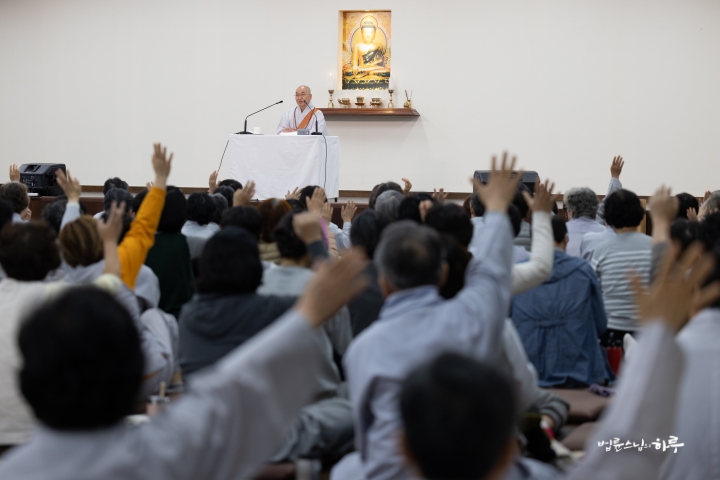
After receiving recommendations on who should be part of the task force team for revitalizing the Jungto Social and Cultural Center, the discussion was concluded, and a short break was taken.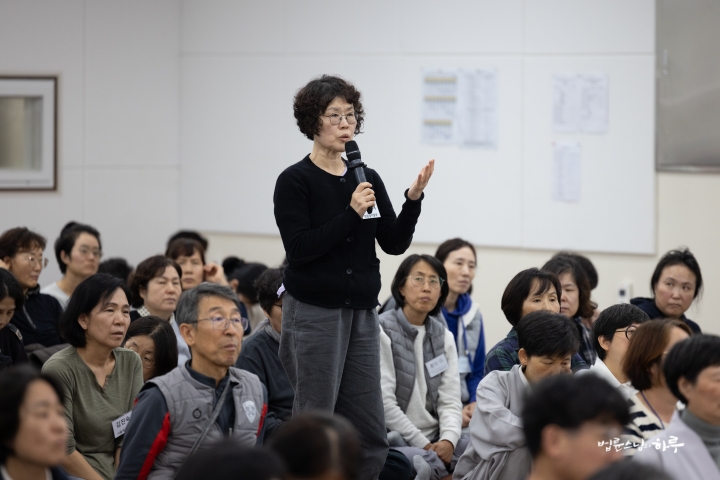
Then, regarding the specific implementation method if the Jungto Dharma School and Sutra Course were to be conducted offline, Sunim checked for opinions in favor and against, confirming the general opinion of the members in broad terms. Finally, Sunim made several proposals on how the Jungto Social and Cultural Center revitalization plan could be combined with social movements and gathered opinions from the members. Various opinions were expressed, including the war crisis situation on the Korean Peninsula and peace movements, environmental movements in the era of climate crisis, and plans to create new public interest by establishing a Jungto Social University.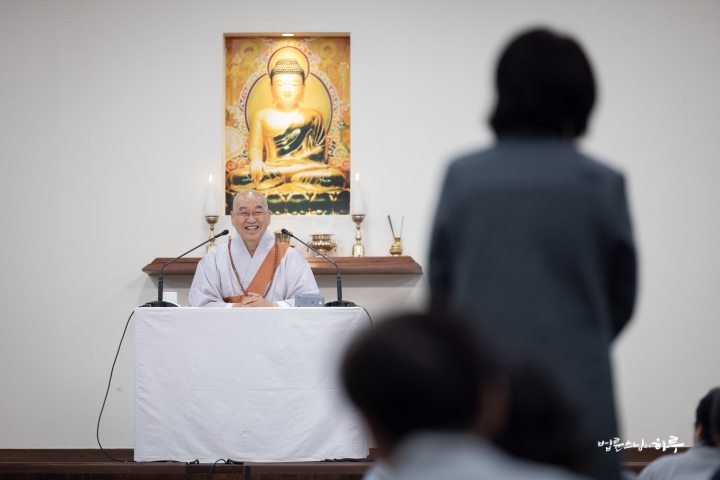
However, Sunim added one more point, saying that when planning new projects from now on, it would be good to have a different perspective than before.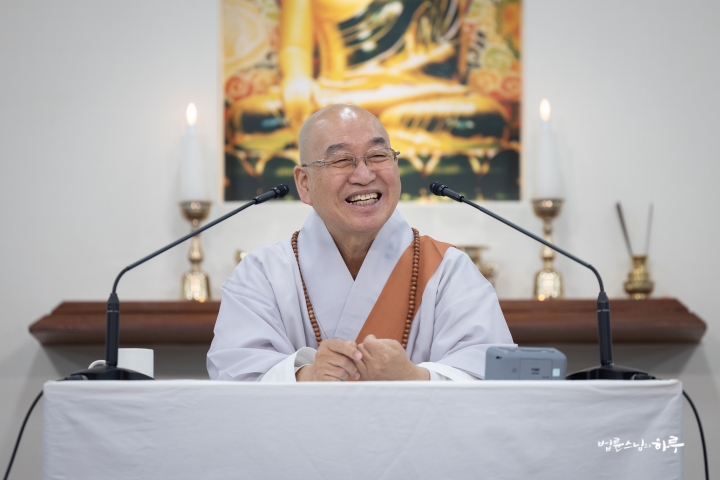
“Programs involving Venerable Pomnyun Sunim are effective in the short term, but there are limitations in spreading them globally. For example, if Venerable Pomnyun Sunim directly participates in a new program at the Jungto Social and Cultural Center, it helps at the start. But when it’s done in other regions in the future, Venerable Pomnyun Sunim would have to go there directly, and if he can’t, it creates issues of fairness. When Buddha was alive, his presence greatly helped in spreading the Dharma, but if Buddha had lived until now, the spread of the Dharma might have been limited to the range of Buddha’s activities and might not have spread worldwide. If Buddha were alive, everyone would want to go and ask him directly, but because Buddha passed away, even when disciples recite the teachings, authority is vested in the speaker. So, it’s very necessary to program and spread as much as possible. Although it might be difficult at first, this way we can spread the same model worldwide.
If Jungto Society wants to spread the Dharma globally, I think it’s right to revitalize with programs that don’t include Venerable Pomnyun Sunim from now on. Except for very special cases, it’s better to make more than 90 percent of the programs without me. Except for topics that have not yet been addressed in Dharma talks and require new recordings, or instances where a Dharma talk is given only once at the beginning of a program, it is necessary to systematize and disseminate all other content as programs. That’s how we can expand infinitely. For instance, if programming is done well in Seoul, in the future, local areas can just take the program and operate it identically. In the past, Jungto Society was able to rapidly expand Dharma centers because we introduced a method of playing video Dharma talks even when Venerable Pomnyun Sunim couldn’t go directly. The method where Venerable Pomnyun Sunim has to attend all programs has short-term effects but has limitations in long-term expansion. Of course, we’ll follow your opinions, but from this time, I think it’s better to plan programs without Venerable Pomnyun Sunim if possible.”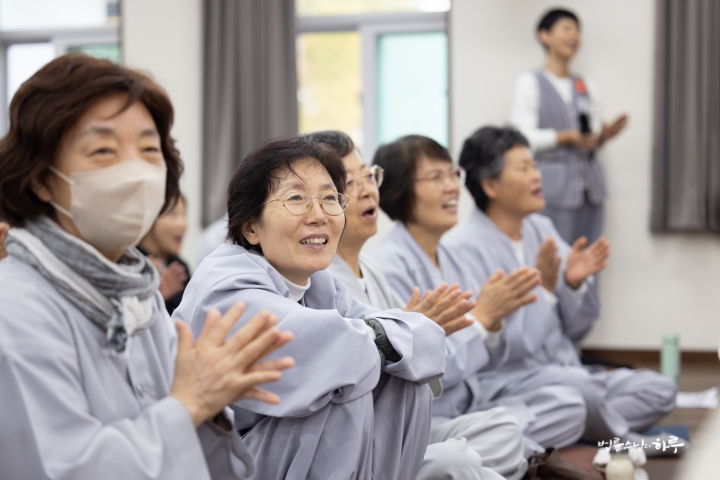
After this conversation, the two-day meeting was concluded.
Everyone bowed three times to request a closing Dharma talk from Sunim. Sunim encouraged the members who had worked hard discussing for two days, emphasizing that practice is about letting go of impatient minds and greed.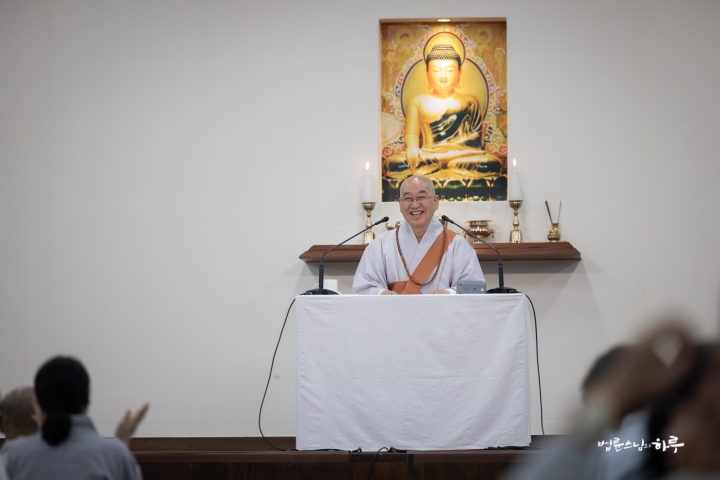
“The conclusion we’ve reached through this meeting, even if it’s the same as the opinion gathered by a few representatives, has a completely different meaning. It’s more important that we all directly participated in the process of gathering opinions and consolidated our intentions. When we pursue projects after gathering our intentions like this, those projects gain strength.
Looking back on the past 30 years of history, Jungto Society has always faced many difficulties. However, each time, the members gathered their intentions and turned crises into opportunities. Looking back, difficulties often turned out to be blessings in disguise. Jungto Society didn’t come this far by receiving good opportunities from someone else, but through our own wisdom and efforts, turning difficulties into opportunities.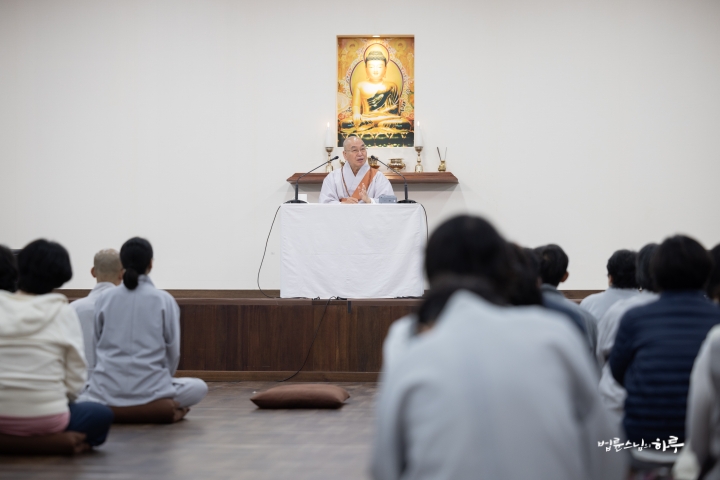
Since the COVID-19 pandemic, Jungto Society has been in a slight stagnation phase. This crisis can be an opportunity to realize that we need to research and prepare more deeply to go further. In that aspect, the small attempt we’re trying to make this time can be a new start to achieve the original goals set by Jungto Society.
Our brains don’t instantly produce ideas just because we start thinking. As we keep talking with others from various perspectives, our brains slowly start to respond. When we continuously focus on one topic, as time passes, our brains come up with related ideas. Sometimes, delusions keep arising and become obstacles to solving problems, but sometimes, good ideas keep coming up, increasing the possibility of improving the situation.
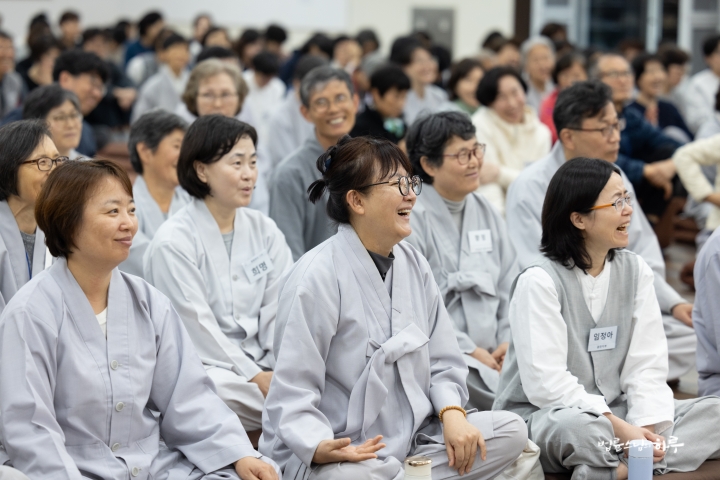
Practice Is Letting Go of Impatience and Greed
During this two-day meeting, we have reached a certain level of consensus. While our intentions have aligned, whether this conclusion meets the needs of the general public in today’s era is a separate issue. This is because our intentions may differ from public demands. Since we haven’t drawn our conclusions based on precise public opinion surveys to accurately understand public needs, if our conclusions don’t align with public demands, we may face significant difficulties initially. However, if we evaluate our efforts based on our intentions and efforts rather than just quantitative results, I believe these difficulties will be overcome with time. If we time it well, we’ll see effects quickly; if not, it may take a bit longer. If we can’t endure that time, we’ll give up midway, but if we persevere, our efforts will eventually sprout and bloom when the time comes.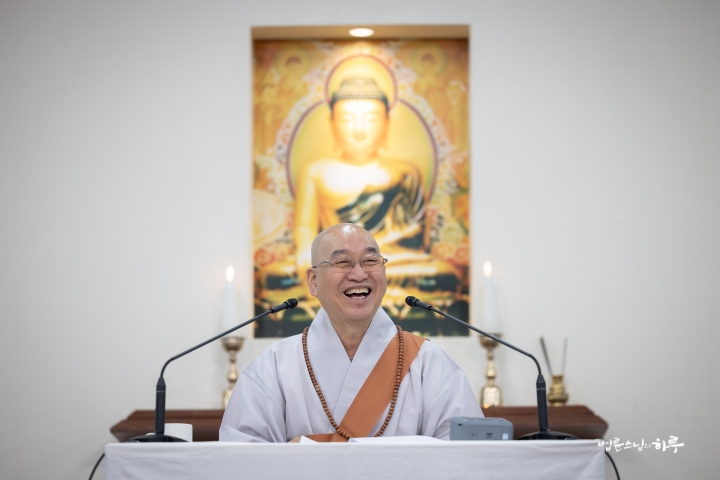
It’s fortunate if the timing is right, but even if it isn’t, we need the strength to persist until the right time comes. If we’re impatient or greedy, we won’t be able to endure that period and will give up, ultimately failing. Letting go of impatience and greed is practice. From the perspective of practice, we may say that while it may take time, failure doesn’t exist. In practice, the concept of ‘failure’ simply does not exist.
Thank you for your hard work over these two days. This is the first time we’ve gathered in person since being elected to represent various Jungto Society departments, chapters, and branches. I hope the passionate energy from fellow practitioners gathered here will become a great source of strength for each of you to carry on vigorously for the remaining year.”
After the Dharma talk, at Sunim’s impromptu suggestion, representatives from each branch came forward one by one to introduce themselves.
“Since we finished the Dharma talk early, it would be nice to see each other’s faces while we’re all gathered here. Please take the microphone one by one and introduce yourself.”
All 200 members of the Sangha came forward in turn to share their names and roles. After each introduction, there was loud applause and cheers.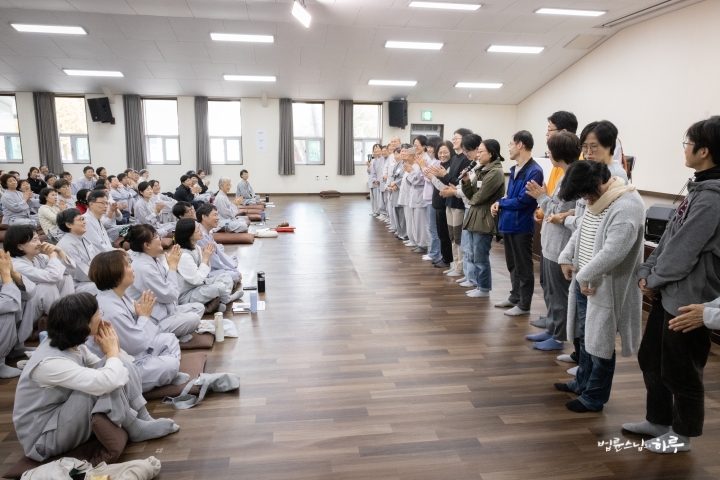
Commemorative photos were also taken with Sunim by branch.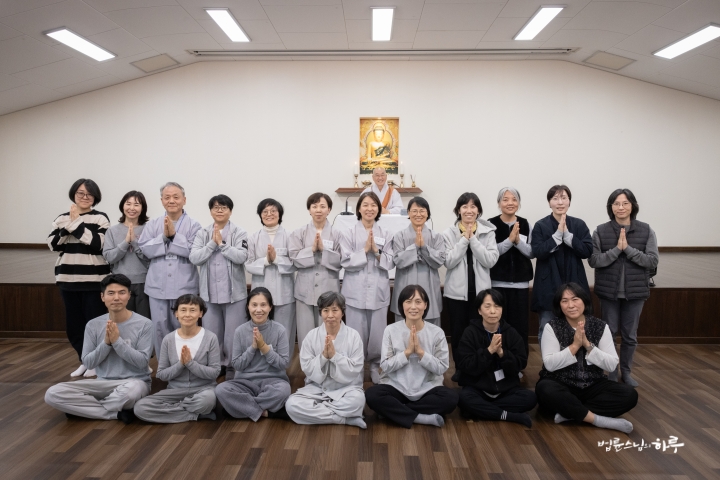
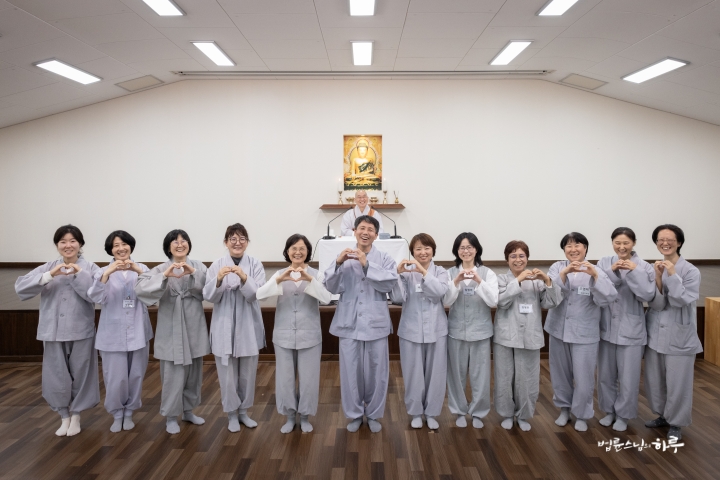
After concluding the meeting with the Four Great Vows, everyone gathered on the steps in front of the main building of the retreat center for a group photo.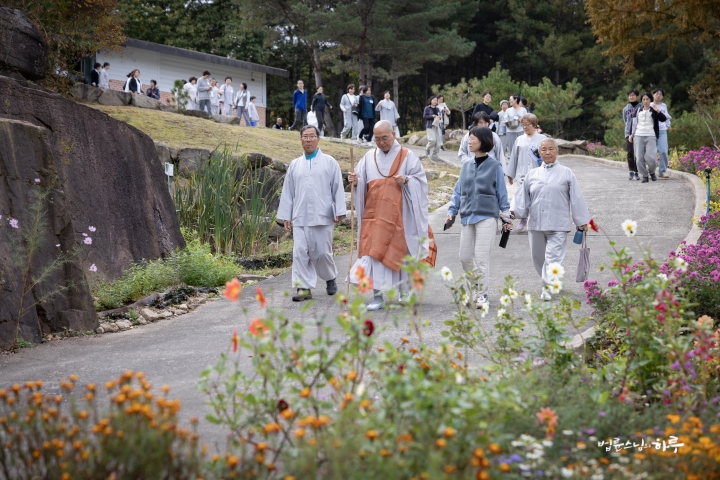
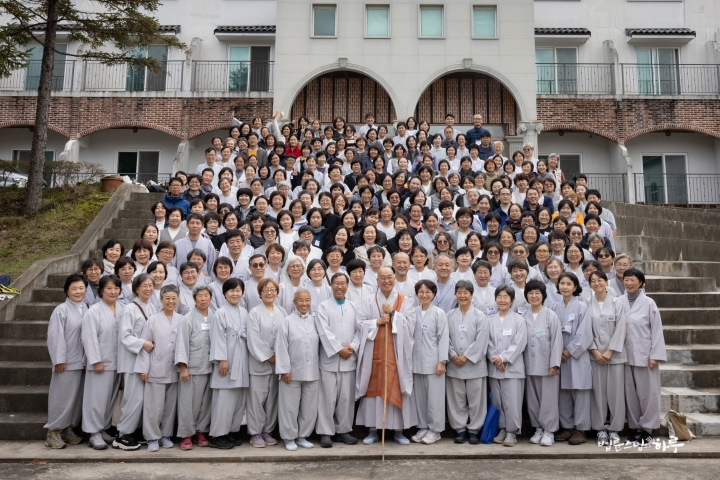
“Everyone, please travel safely. I need to leave now for my flight to Bhutan.”
Sunim bid farewell to the Sangha and immediately departed from Mungyeong for Incheon Airport.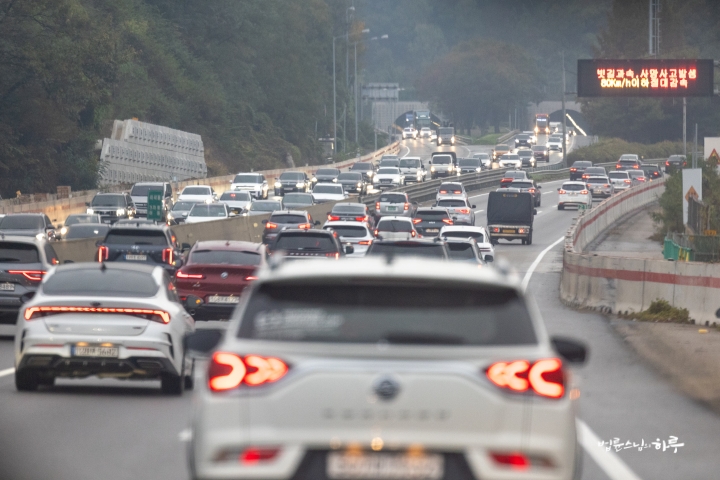
The highway was congested with cars returning from weekend autumn foliage trips. To avoid missing the flight due to traffic, the group took local roads instead of the highway, successfully entering the metropolitan area.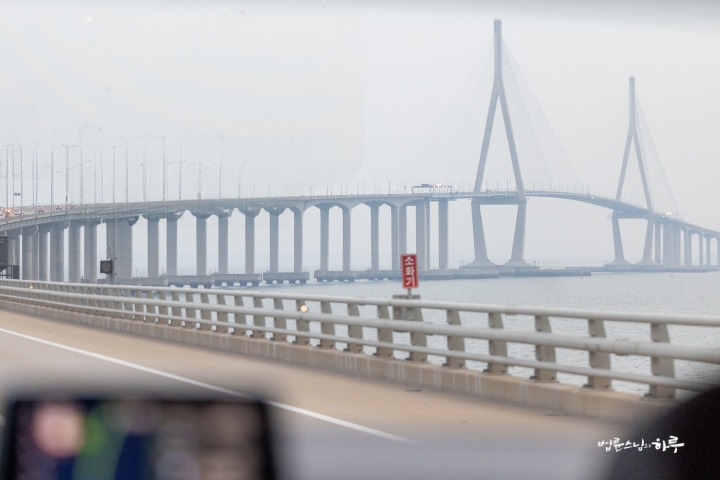
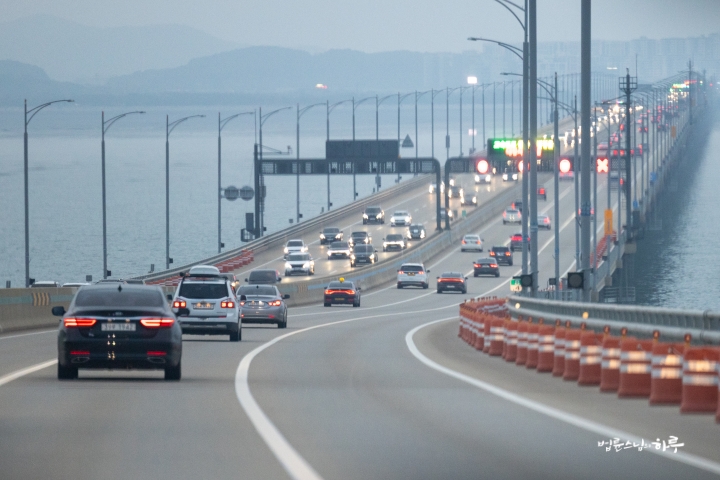
After crossing Incheon Bridge, they arrived at Incheon Airport at 6 PM. Sunim checked in his luggage, completed departure procedures, and headed to the boarding gate.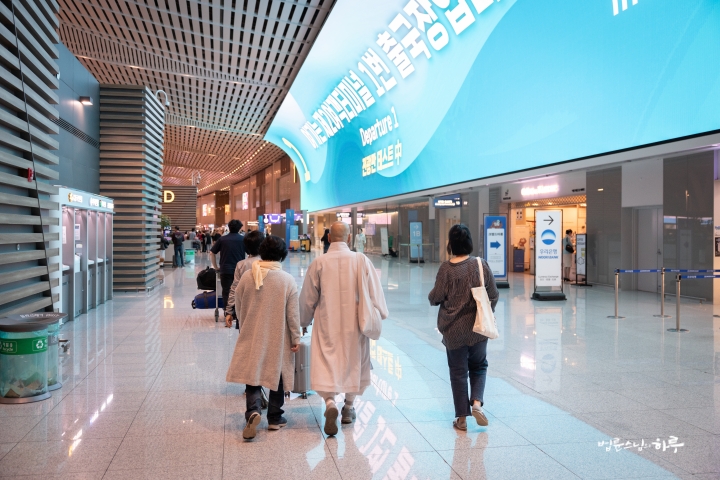
The plane departed from Incheon Airport at 8:35 PM and arrived at Bangkok Airport at 2:45 AM after a 6-hour and 10-minute flight, which was 12:45 AM local time.
Tomorrow, the plan is to depart from Bangkok Airport at 5 AM and arrive at Paro Airport in Bhutan at 7:15 AM local time. From there, they will immediately travel by car for 11 hours to stay overnight in Nabji village.




